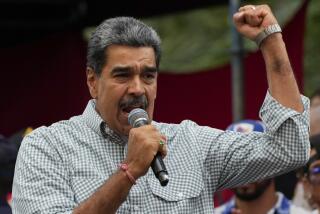3 arrested on U.S. arms, terrorism charges
- Share via
An alleged international arms dealer accused of arming militants from Iraq to Nicaragua for decades has been arrested on U.S. charges of conspiring to supply Colombian rebels with millions of dollars’ worth of weapons, federal authorities said Friday.
Monzer Kassar of Marbella, Spain, and codefendants Tareq Mousa Ghazi and Luis Felipe Moreno Godoy were arrested Thursday as they prepared to complete a transaction to pay for the weapons, federal officials said.
The arms were headed to the FARC, the Spanish acronym for the Revolutionary Armed Forces of Colombia, according to a federal indictment unsealed Friday in New York.
The left-wing FARC is accused of killing thousands in Colombia in its decades-long battle with government and right-wing paramilitary forces. The United States classifies it as a terrorist organization.
Between February 2006 and May 2007, Kassar, Ghazi and Moreno agreed to sell thousands of machine guns, millions of rounds of ammunition, rocket-propelled grenade launchers and surface-to-air missile systems to the FARC, according to Michael J. Garcia, U.S. attorney for the Southern District of New York.
During a series of recorded telephone calls, e-mails and face-to-face meetings, the three men agreed to sell the weapons to two confidential sources working with the U.S. Drug Enforcement Administration, according to the indictment. The two men were posing as FARC militants who claimed they wanted the weapons to attack U.S. helicopters conducting anti-drug and anti-terrorism missions in Colombia, the indictment said.
Authorities arrested the suspects before any weapons could be shipped, and said their capture capped an undercover investigation that had been underway for several years.
Kassar, 61, is believed to have amassed a fortune from arms dealing since the early 1970s. His alleged trafficking in high-powered weapons has “fueled the most violent conflicts of the last three decades,” Garcia said at a news conference in New York.
He said Kassar had provided weapons and military equipment used in conflicts in Nicaragua, Brazil, Cyprus, Bosnia-Herzegovina, Croatia, Somalia, Iran and Iraq, and that he had sold weapons to organizations the U.S. government considers terrorist, including the Palestine Liberation Front.
“He operates in the shadows, the silent partner behind the business of death and terror,” DEA Administrator Karen P. Tandy said of Kassar.
Kassar, also known as Abu Munawar and “El Taous,” was arrested on the U.S. charges by Spanish authorities in Madrid, and Ghazi and Moreno were arrested in Romania.
The indictment alleges that Kassar, who is originally from Syria, developed an international network of criminal associates to carry out a weapons-trafficking business, including Ghazi, 60, of Lebanon, and Moreno, 58, of Marbella. He also used front companies and bank accounts in Britain, Spain, Syria, Iraq, Poland, Bulgaria, Romania and other countries to carry out his business and disguise the illicit nature of his criminal proceeds, according to the indictment.
Kassar promised to provide the FARC with “C4 explosives, as well as expert trainers from Lebanon to teach the FARC how to effectively use C4 and improvised explosive devices,” the indictment and federal authorities alleged.
“In addition, Kassar offered to send a thousand men to fight with the FARC against U.S. military officers in Colombia,” Garcia said.
Kassar, Ghazi and Moreno were charged with four separate terrorism offenses: conspiracy to kill U.S. nationals, conspiracy to kill U.S. officers or employees, conspiracy to provide material support or resources to a designated foreign terrorist organization, and conspiracy to acquire and use an antiaircraft missile. Kassar and Moreno were also charged with money-laundering.
If convicted on all counts, the men face a sentence of life in prison without parole.
More to Read
Sign up for Essential California
The most important California stories and recommendations in your inbox every morning.
You may occasionally receive promotional content from the Los Angeles Times.













